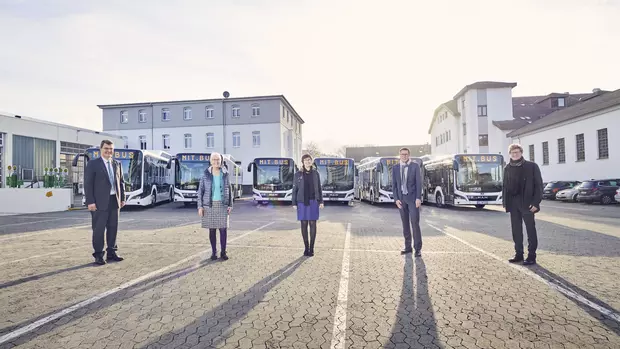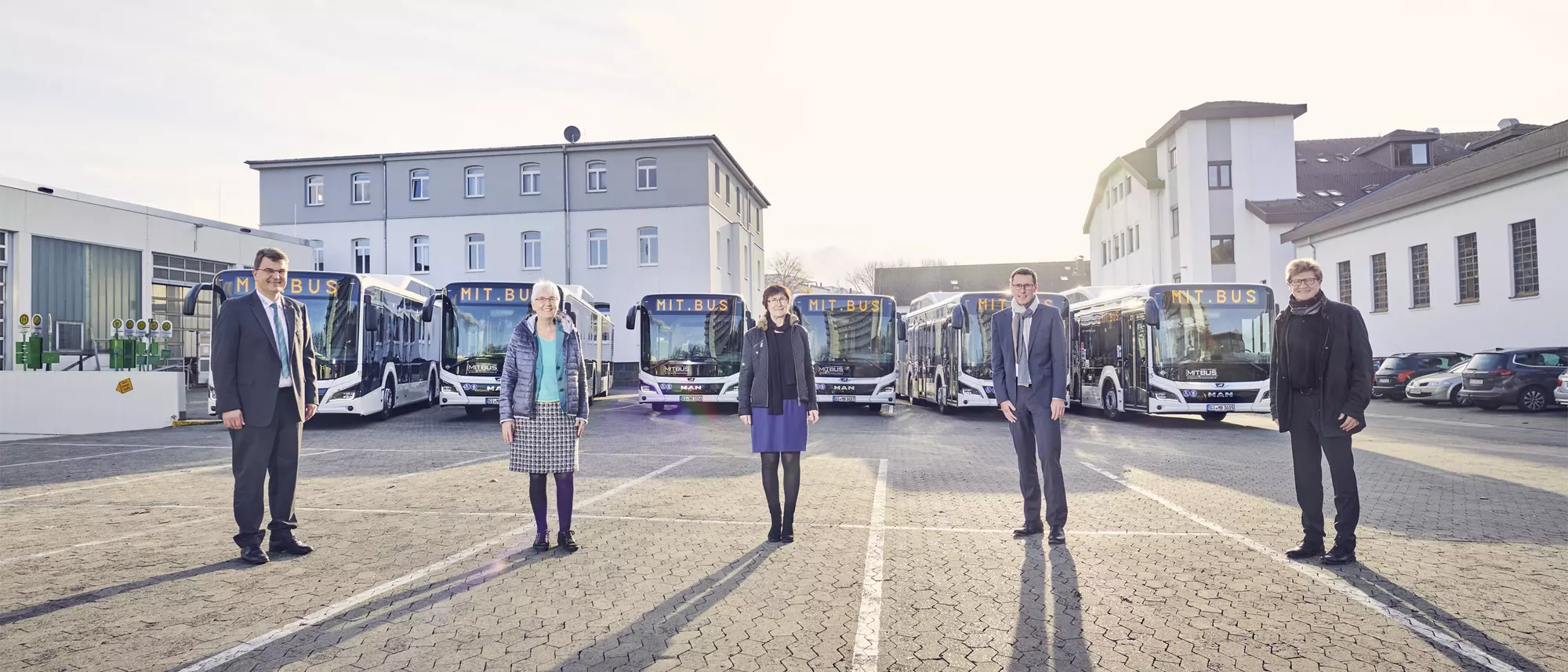
The municipal utility subsidiary MIT.BUS has purchased six articulated natural gas buses of the latest generation. In addition to their CO2-neutral drive - they run on bio natural gas - the vehicles impress with their sophisticated hybrid technology and highly functional design.
MIT.BUS, a subsidiary of Stadtwerke Gießen (SWG), has had a fleet of vehicles that run entirely on bio natural gas for a good one and a half years. The company has now replaced the oldest six articulated trains with the advanced drive system. And is raising the bar even higher in terms of environmental protection. This is because each of the MAN Lion's City 18 C buses needs around 4,450 kilograms less fuel for the 50,000 kilometres it covers each year. The total saving therefore amounts to around 26,700 kilograms.
This is made possible by a system called EfficientHybrid. "The new buses have a start-stop function that switches off the engine at bus stops and red lights, thus reducing emissions to zero during this time," explains Mathias Carl, Managing Director of MIT.BUS, at the official presentation of the vehicles, which was attended by SWG board members as well as Astrid Eibelshäuser, Chairwoman of the SWG Supervisory Board, and City Councillor Gerda Weigel-Greilich.
The electrical energy required for these frequent starting processes is produced by the vehicle itself - during braking. The crankshaft starter generator (KSG) - as MAN calls the drive component designed for this purpose - generates electricity during each braking process, which is stored in a powerful battery. Experts call this recuperation.
Even more plus points
The new technology offers further advantages: instead of the usual two alternators, EfficientHybrid buses only need one. In addition, a newly developed, economical engine with a displacement of 9.5 litres and 320 hp is now sufficient. Previously, 12-litre engines did their duty at the rear of the buses. "This downsizing makes the vehicles considerably lighter than their predecessors," adds Matthias Funk, Chief Technical Officer at SWG. All of this has a positive effect on fuel consumption. Particularly worth mentioning: thanks to intelligent engine management, the smaller, more economical engine delivers greater torque - in simple terms, more power when accelerating.
In addition, the quiet and smooth-running engine, combined with independent suspension and many optimisations in the interior, significantly increases passenger comfort. Raised side windows allow more daylight into the passenger compartment. When it gets dark outside, the ambient lighting based on modern LEDs comes on. Swivelling sliding doors with low-slung handrails allow easy entry and exit. The new buses also have two wheelchair spaces, one of which is also suitable for e-scooters.
Safety is a top priority
To ensure that all passengers get from A to B safely even when the bus is busy, the buses have numerous handrails with stop request buttons. Integrated video surveillance provides additional safety. And a turning assistance system protects pedestrians and cyclists. This is because it uses a camera to monitor areas that are difficult or impossible for the driver to see. Last but not least, a driver's cab with an optimised seat and ergonomic controls makes life a little easier for drivers in tough everyday situations. An integrated windscreen protects against aerosols.
It goes without saying that MIT.BUS had all six buses equipped with a passenger counting system. "The new vehicles provide us with important information for improving our local transport services," says Jens Schmidt, Commercial Director of SWG.
Modern design, good environmental values
"The buses are real eye-catchers - and not just for the passengers," Mathias Carl is certain. However, the appealing, modern design did not even play a subordinate role in the decision to purchase this particular model. "What counts for us are the aspects of environmental protection, economy and function," Mathias Carl emphasises. And it is precisely on these points that the 18 metre long MAN Lion's City impresses. Because although they - like all other Giessen city buses - are practically CO2-neutral, the environment benefits from the significant fuel savings. "The new buses are even better for the air in Giessen because they emit less nitrogen oxide due to their lower fuel consumption," explains city councillor Gerda Weigel-Greilich.
The vehicles, which had already been delivered by 20 November, will go into regular service on 24 November. MIT.BUS has invested a total of around 2.6 million euros. "It's great to see that SWG is constantly modernising its bus fleet and thus making an important contribution to attractive public transport in Giessen," adds Astrid Eibelshäuser. Stadtwerke Gießen is indeed consistently pursuing its strategy of promoting environmental protection with modern technology in various areas. And this also includes offering modern, sustainable and future-proof local transport in Giessen.

